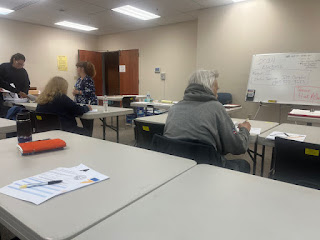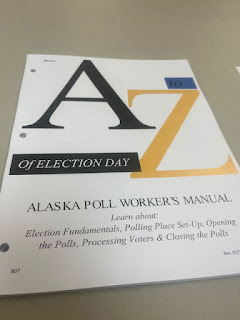Last Thursday I went to training for election workers for the primary (August 20) and the general election in November. This is another effort on my part to contribute to a fair election.
There was a morning training at 9:00am and I opted for the afternoon training at 1pm. I also dropped off our absentee ballots since the training was at the elections office on Gambell. Plus there was early voting going on too.
The door to the training room was closed - the morning training was going on longer than scheduled. By 1:30 people came out and we went in.
The trainer, who had done the morning training, stayed to do ours. She was there for four and a half hours already and then started our training - which took a little over four hours - without a break.
There was a training manual which covered things like getting things set up the night before (mostly signs and tables and things that didn't need security), set up in the morning (starting at 6am to be ready to open at 7am), then how to work the various stations -
- checking names on the register,
- giving out the ballots,
- questioned ballots (if the name isn't on the register or no ID or other irregularities)
- disabled voting procedures (including a large screen for voting with audio and manual controls in braille and other touch sensitive controls),
- special needs voters
- the voting machine for scanning the ballots
- spoiled ballots
Those are most of the topics that were covered. I went through election training in 2022, but that was during COVID and it was all online.
Some things I learned:
1. Questioned ballots - anyone that has any irregularity - they aren't on the register, no ID, at the wrong precinct, or basically any situation where someone insists on voting when they aren't clearly eligible (ie coming after the polls close). We were told that all questioned ballots will be examined by election officials and they will determine if the vote should count.
Since the questioned ballots are in special envelopes with the voters name and info on them, I asked about what we say if they ask if people will know how they voted. The answer was that there's a clear procedure for sorting questioned ballots by what will be counted first. If they vote out of their district, they won't get to vote for the local candidates, but will get to vote for US House, for example. Then the ballots, still in the secrecy sleeves, are taken out of the envelopes, so the ID is gone. Later they get put through the appropriate scanner.
2. Special Needs Voters - these are people who cannot come to the polls for any reason. A representative comes and fills out a form on an envelope, gets a ballot, goes to the voter, lets them vote and fill out the rest of the form. The representative has to sign again after the ballot is filled out and bring it back to the polls. Who does this? People in nursing homes was an example, but they also mentioned a busy chef who couldn't leave the restaurant. The ballot has to be returned by 8pm election day and the form has to be filled out correctly, including the representative's second signature.
It seemed to me that for most situations, it would be far easier for everyone to get a mail in ballot. There's less to fill out and less running around. This certainly would be a better option for the nursing home people. The only people this makes sense tome for, are people who are incapacitated at the last minute. Say someone who tests positive for COVID the night before the election. It also seemed to me that this option is ripe for abuse.
3. Tracking Ballots. There are lots of measures to insure that all the ballots are accounted for. The pads with the ballots have numbers on them (but not the ballots when they are torn out of the pad). The scanners count the number of ballots inserted successfully. All that has to be tallied against the registered and the number of questioned ballots and special needs ballots and spoiled ballots (torn up because the voter made a mistake.) But that still leaves the possibility of someone playing with card in the voting machine. There are paper ballots that could be counted to see if they match what the machine says, but the state doesn't really test many if any precincts to check.
4. The training was thorough. More than most people can digest in the four plus hour training. The manual is a backup, but doesn't have all the information we were given. Our trainer knew her stuff thoroughly. I'm hoping that the others I work with will remember the things I missed or forget.
5. There was additional training for people who will be in charge of the equipment - like the voting machines and the touchscreens.
6. There's a number to call if there are non-English speakers to connect to someone who, hopefully, speaks the voter's language. It wasn't clear how many languages are available. There are no interpreters for the hearing impaired.



Hey, Steve. As they should say in the States to you & all as election workers: Thank-you for your service!
ReplyDeleteBut curious minds want to know: Do you get combat pay for this now-a-days?
I like easy questions. They pay $20 an hour, including for training. They have a program for non-profits to staff a polling place with volunteers and the non-profit gets the money the volunteers would have earned. I'm going that route.
Delete